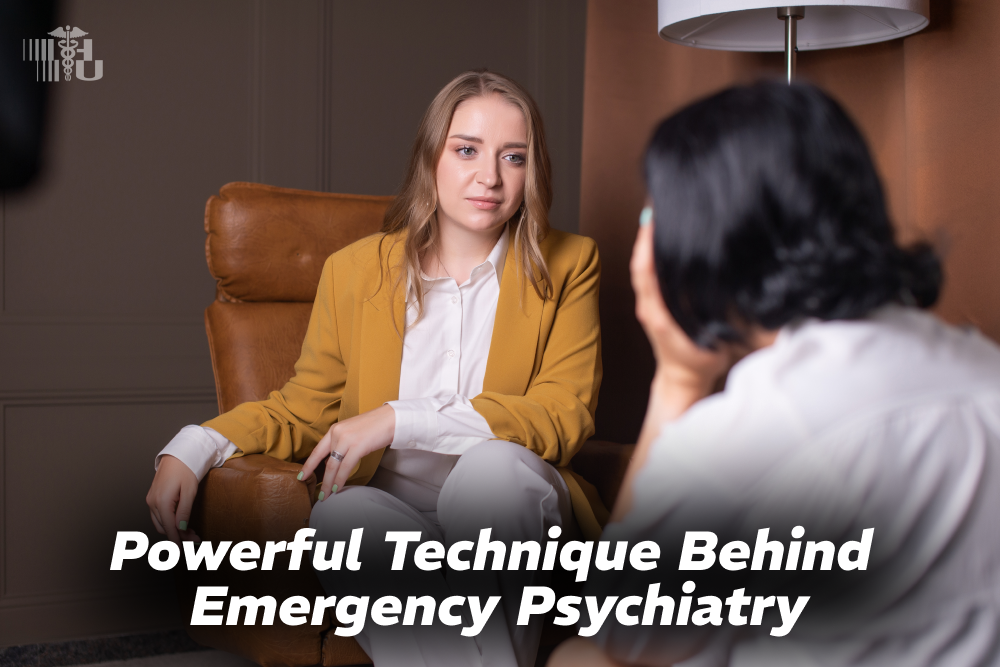In the whirlwind of crisis, Mental Health Evaluations and emergency settings, Motivational Interviewing (MI) has emerged as a compassionate and effective approach to care. When mental health challenges strike suddenly and intensely, be it suicidal thoughts, psychotic episodes, or severe anxiety, patients often find themselves overwhelmed, vulnerable, and ambivalent about the help they need. In these critical moments, mental health professionals such as psychiatrists, psychologists, therapists, and psychiatric nurses face the challenge of not only ensuring immediate safety but also encouraging ongoing engagement with treatment, including medication management. MI offers a unique, client-centered method that bridges these urgent needs with longer-term recovery.
Meeting Crisis with Compassion
Crisis mental health care often unfolds in emergency departments (EDs) or through mobile crisis teams dispatched to communities. These environments can be hectic, with clinicians conducting rapid risk assessments to judge imminent danger. Although safeguarding physical safety is paramount, these traditional assessments don’t always leave room to explore a patient’s internal motivations or hopes. This is where MI steps in, turning brief encounters into meaningful conversations that can spark change.
At its core, Motivational interviewing is a gentle, guiding conversation built on four main steps: engaging, focusing, evoking, and planning. Even amid the noise and urgency of an emergency room, a clinician trained in MI will prioritize building trust and a nonjudgmental connection with the patient. They will help the individual identify what truly matters most to them, explore feelings about change, and collaborate on concrete next steps if and when the patient feels ready.
Imagine a young adult arriving at an ED after a suicide attempt. Instead of simply ticking off risk evaluation boxes, an MI-informed psychiatrist or therapist invites them to share their personal goals or dreams, perhaps wanting to feel less alone or regain control over their emotions. Such conversations lower patients’ resistance and open the door for engagement beyond the crisis moment.
Proven Benefits of MI in Emergency Psychiatry
Research underscores the power of MI in these critical settings. Studies demonstrate that brief MI interventions during or shortly after an emergency visit reduce the severity of suicidal ideation and increase the likelihood that individuals will connect with follow-up mental health services. This is vital since the days and weeks following an ED visit are often the highest-risk period for suicide attempts, yet many patients disengage from care. MI helps by actively addressing ambivalence toward treatment, reinforcing personal motivation to pursue help.
MI has also shown promise with patients experiencing acute psychosis in inpatient psychiatric units. These patients often resist treatment or medication, not due to unwillingness but because of genuine fear or confusion. The collaborative, respectful spirit of MI allows psychiatrists to discuss medication management and therapy adherence in a way that honors patient autonomy and empowers choices, improving trust and cooperation.
Telepsychiatry and Mobile Crisis Teams
The rise of telepsychiatry is transforming how emergency mental health care is delivered. Psychiatrists and psychologists can now connect with patients in crisis via video, removing geographical and stigma-related barriers. MI adapts naturally to this remote format, facilitating open, supportive discussions where patients can express feelings and explore ambivalence in a safe, private space.
Similarly, mobile crisis teams, those behavioral health professionals who provide community-based interventions during mental health emergencies, are increasingly using MI tactics. These teams frequently meet individuals suspicious or fearful of traditional mental health systems. MI’s respect and empathy help build rapport in those tense moments, increasing the chance that individuals will accept further help rather than resist or flee from care.
Medication Management in the Midst of Crisis
One of the most sensitive aspects of emergency mental health treatment is Medication Management. Psychiatrists must often move quickly to determine if medications are appropriate, explain their benefits and risks, and arrange prescriptions. MI makes this process more collaborative—rather than imposing medication, psychiatrists engage patients in open conversations about concerns and preferences. This approach enhances adherence, reducing treatment dropouts after discharge and supporting sustained recovery.
Beyond Stabilization: Building a Path Forward
Crisis evaluation is only the starting point. The ultimate aim is to stabilize patients and set them on a path toward long-term wellness. MI aligns perfectly with this goal by nudging individuals from a place of ambivalence into active participation in their own healing journeys guided by their values and motivations.
This client-centered approach fosters more effective coordination across behavioral health disciplines: psychiatrists managing medications, psychologists providing therapy, and therapists supporting ongoing coping strategies. MI principles maintain a focus on partnership and empowerment throughout.
A Transformational Story: Michael’s Journey
Consider Michael, a 22-year-old brought to the ED after hallucinations and expressing self-harming intent. Instead of rushing to diagnose and prescribe, the MI-trained psychiatrist asked, “What are your hopes for the next few weeks?” Michael shared fears of losing control and stigma around medication. Through reflective listening and open-ended questions, the psychiatrist helped Michael articulate small but meaningful goals: improving sleep, reducing anxiety, and reconnecting socially.
Following discharge, Michael engaged with a Telepsychiatry Service where MI continued to guide medication adjustments and therapy exploration. Feeling heard and respected, Michael committed to his recovery, turning what could have been a disempowering crisis into a hopeful turning point.
Training for Tomorrow
Given MI’s growing evidence base, there is a strong movement to train all providers involved in crisis settings: psychiatrists, psychologists, therapists, nurses, and mobile crisis workers in MI techniques. Even brief but focused training improves referral rates and reduces suicidality, especially in busy, high-pressure emergency departments. Coupling MI with telepsychiatry platforms further magnifies its reach.
Compassionate Collaboration Saves Lives
Every moment counts in mental health crises. Motivational Interviewing offers a compassionate, effective way to navigate these high-stakes encounters by honoring individual autonomy and leveraging internal motivation. It fosters genuine engagement through empathetic conversation, not coercion, helps strengthen follow-through on treatment plans, including medication management, and builds collaborative alliances across behavioral health professionals.
For patients in crisis, MI can transform a frightening emergency room visit into the first step toward lasting recovery. For clinicians confronting the challenges of emergency mental health care, MI provides a powerful tool to listen deeply, empower authentically, and guide with compassion toward a healthier future.
Harmony United Psychiatric Care across Florida is a leading Mental health clinic that provides trusted psychiatry care for your undefined needs. We understand your psychological problems, which is why we provide telepsychiatry services to ensure your privacy and security.
For more information about mental health conditions, visit our Mental Health Library page. To understand and cope with your major depressive disorder symptoms, get help from our top psychiatrists, psychologists, and therapists, who are known for providing the best mental health treatment and psychiatry services. To book an appointment, please call us at (800) 457-4573 or submit an appointment request.



Leave a Reply